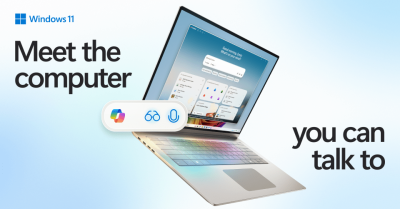Microsoft's AI Leap: The Future of Windows is Conversational and Autonomous
By: @devadigax

As Microsoft prepares to bid a significant farewell to Windows 10, marking the end of an era, and simultaneously celebrates the remarkable 40-year milestone of its flagship operating system, the tech giant is setting its sights firmly on the future. While a formal announcement for Windows 12 might still be on the horizon, the direction is unequivocally clear: Microsoft intends to embed artificial intelligence deeply into the very fabric of Windows, transforming every PC into a conversational, AI-controlled powerhouse. This bold vision represents a profound shift, moving beyond mere task automation to an operating system that understands, anticipates, and proactively manages aspects of your digital life through natural language interaction.
The concept of talking to your computer isn't entirely new; voice assistants like Cortana have been integrated into Windows for years. However, Microsoft's renewed push goes far beyond simple commands. It envisions a fully integrated AI layer, powered by advanced large language models (LLMs) and generative AI, that can comprehend complex requests, maintain context across interactions, and even initiate actions autonomously. This isn't just about launching apps with your voice; it's about an AI that can help you write documents, summarize meetings, troubleshoot system issues, organize your files, and even manage your schedule, all through natural dialogue.
This strategic pivot is a natural evolution of Microsoft's broader AI initiatives, most notably its Copilot suite. From Copilot in Windows 11 to Microsoft 365 Copilot, the company has been systematically introducing AI assistants designed to augment user productivity across various applications. The next logical step is to elevate this assistant from an application-specific helper to an operating system-level intelligence. Imagine a scenario where you simply tell your PC, "Find all emails from Sarah regarding the Q3 report, summarize the key action items, and draft a response accepting the meeting invite for next Tuesday." The AI, deeply integrated into Windows, would then execute these multi-faceted tasks across Outlook, Word, and Calendar, seamlessly.
The allure of an AI-controlled PC lies in its potential to dramatically enhance efficiency and accessibility. For many, navigating complex menus and settings can be cumbersome. Conversational AI democratizes computing by allowing users to interact with their devices in the most natural way possible: through spoken language. This could be particularly transformative for users with disabilities, offering new avenues for interaction. Furthermore, a proactive AI could anticipate needs, such as suggesting relevant documents before a meeting, optimizing system performance in the background, or flagging potential security risks without explicit user prompts. This shift from reactive to proactive computing promises a more intuitive and less demanding user experience.
However, such a powerful integration of AI also brings significant considerations, particularly around privacy, data security, and user trust. An AI that "controls" aspects of your PC would require deep access to your personal data, preferences, and digital habits. Microsoft will need to meticulously address how this data is collected, processed, and secured, ensuring transparency and providing users with granular control over their information. Building and maintaining user trust will be paramount for the widespread adoption of such an intelligent operating
The concept of talking to your computer isn't entirely new; voice assistants like Cortana have been integrated into Windows for years. However, Microsoft's renewed push goes far beyond simple commands. It envisions a fully integrated AI layer, powered by advanced large language models (LLMs) and generative AI, that can comprehend complex requests, maintain context across interactions, and even initiate actions autonomously. This isn't just about launching apps with your voice; it's about an AI that can help you write documents, summarize meetings, troubleshoot system issues, organize your files, and even manage your schedule, all through natural dialogue.
This strategic pivot is a natural evolution of Microsoft's broader AI initiatives, most notably its Copilot suite. From Copilot in Windows 11 to Microsoft 365 Copilot, the company has been systematically introducing AI assistants designed to augment user productivity across various applications. The next logical step is to elevate this assistant from an application-specific helper to an operating system-level intelligence. Imagine a scenario where you simply tell your PC, "Find all emails from Sarah regarding the Q3 report, summarize the key action items, and draft a response accepting the meeting invite for next Tuesday." The AI, deeply integrated into Windows, would then execute these multi-faceted tasks across Outlook, Word, and Calendar, seamlessly.
The allure of an AI-controlled PC lies in its potential to dramatically enhance efficiency and accessibility. For many, navigating complex menus and settings can be cumbersome. Conversational AI democratizes computing by allowing users to interact with their devices in the most natural way possible: through spoken language. This could be particularly transformative for users with disabilities, offering new avenues for interaction. Furthermore, a proactive AI could anticipate needs, such as suggesting relevant documents before a meeting, optimizing system performance in the background, or flagging potential security risks without explicit user prompts. This shift from reactive to proactive computing promises a more intuitive and less demanding user experience.
However, such a powerful integration of AI also brings significant considerations, particularly around privacy, data security, and user trust. An AI that "controls" aspects of your PC would require deep access to your personal data, preferences, and digital habits. Microsoft will need to meticulously address how this data is collected, processed, and secured, ensuring transparency and providing users with granular control over their information. Building and maintaining user trust will be paramount for the widespread adoption of such an intelligent operating
 AI Tool Buzz
AI Tool Buzz